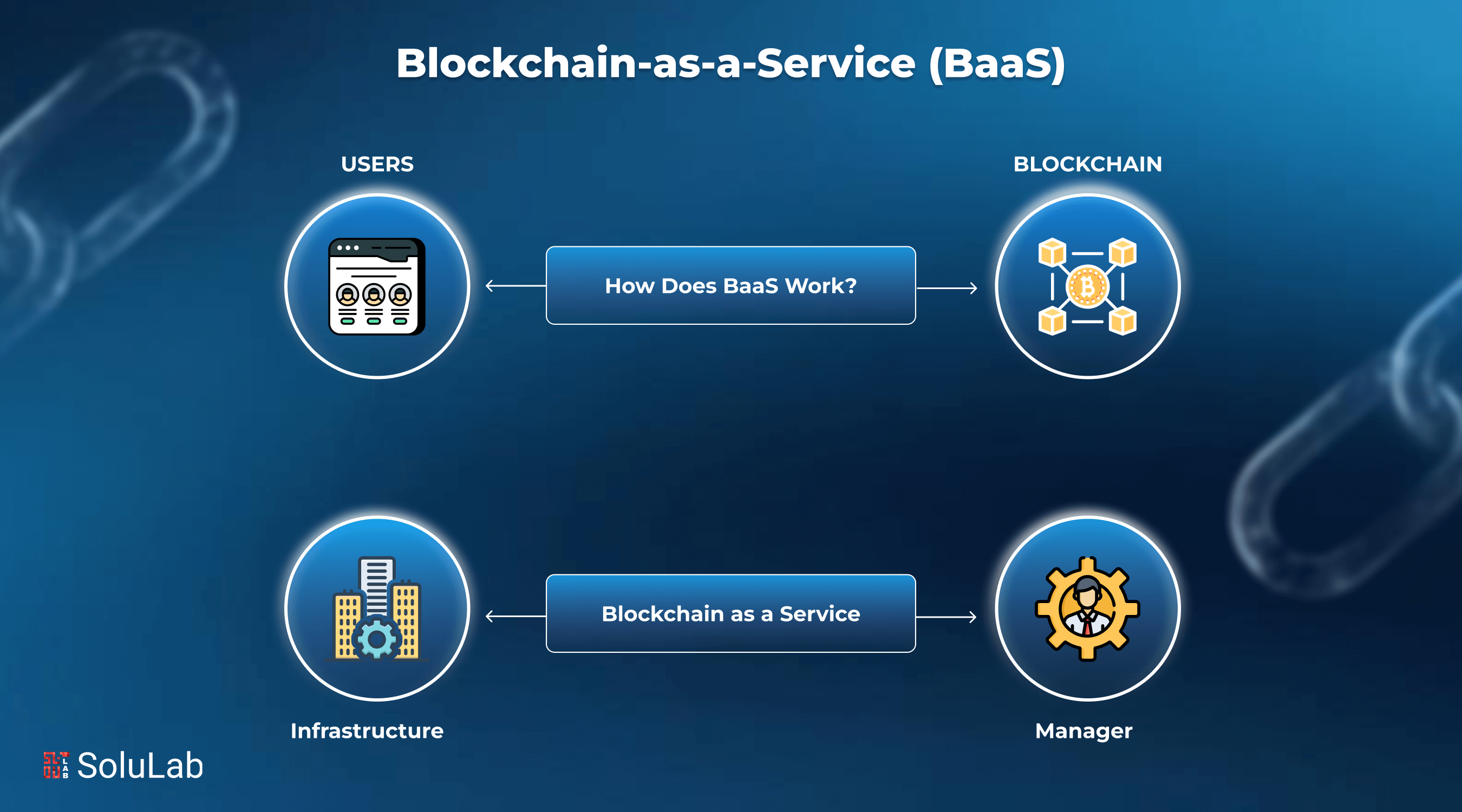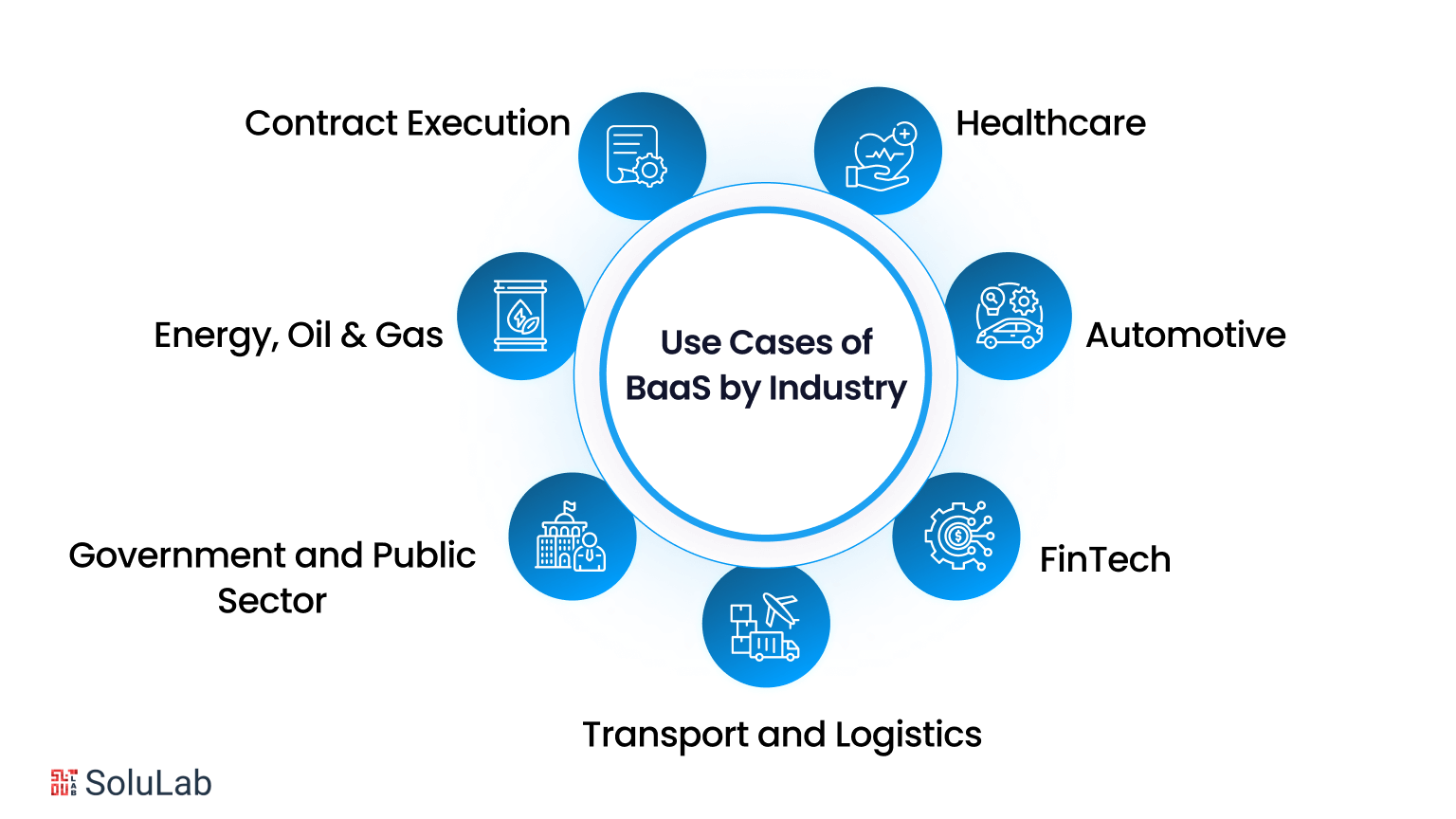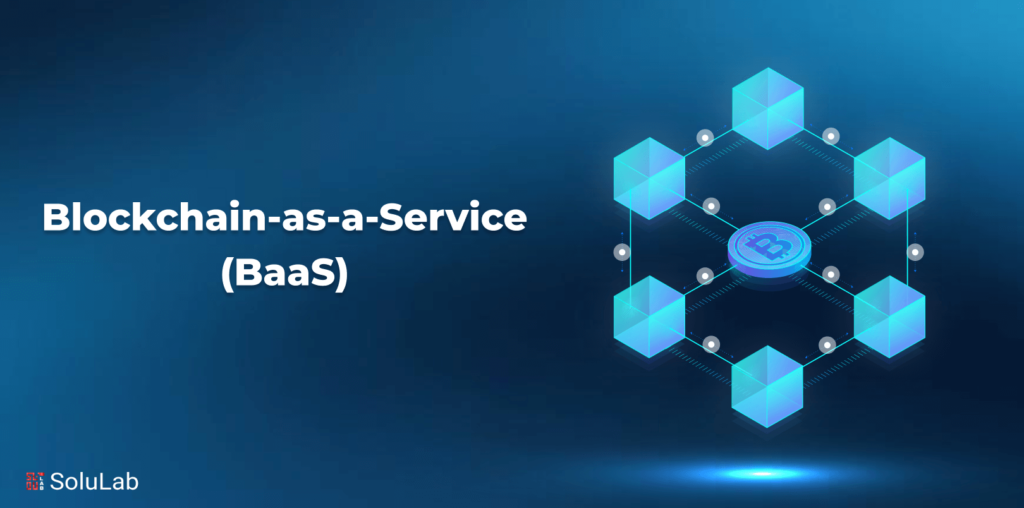
Building a blockchain solution from scratch can be a massive headache—high costs, complex infrastructure, and the need for a specialized tech team. For many businesses, these hurdles make blockchain feel out of reach.
Blockchain is no longer solely connected to Bitcoin and cryptocurrencies. Companies are now seeing how it might lower operating expenses and improve equity.
The global BaaS market was valued at approximately USD 4.3 billion in 2024 and is projected to reach USD 68 billion by 2030, growing at a CAGR of 58%.
Blockchain is generating major advances in efficiency and accountability across a wide range of sectors, from simplifying government operations to changing contract enforcement. In this blog, we’ll explore what blockchain as a service is, use cases, and more.
What is Blockchain-as-a-Service?
Blockchain-as-a-Service (BaaS) refers to third-party providers who create and manage cloud-based networks for companies developing blockchain applications. This service is a recent addition to the rapidly growing blockchain technology field.
While blockchain is most commonly associated with cryptocurrency transactions, its use has expanded to secure various types of transactions. As a result, there is a rising demand for hosting services to support these applications.
How Does the Business Model for Blockchain-as-a-Service Work?
The method via which third parties set up, host, and manage a Blockchain network on account of enterprises is referred to as the blockchain-as-a-service business model. In exchange for payments, the service provider provides the services for setting up blockchain technology and infrastructure.
Blockchain-as-a-service for businesses functions much like a web hosting company in many aspects. It gives clients access to cloud-based tools for creating and hosting smart contracts and Blockchain applications within the provider-managed ecosystem.
In conventional businesses, the BaaS integration offers assistance for resource allocation, bandwidth control, data security features, and hosting needs. The ability of businesses to focus on their core competencies rather than the intricacies of Blockchain operations is the largest effect of BaaS on a company.
How Organizations are Being Shaped by Blockchain-as-a-Service?
BaaS is transforming businesses with a modern touch. Here’s a breakdown of how the business model for Blockchain-as-a-Service (BaaS) works:
1. Third-Party Provider Management: BaaS providers offer infrastructure for businesses to create and manage their blockchain applications on cloud-based networks. These services handle the technical aspects, including network setup, smart contract creation, and blockchain hosting.
2. Subscription-Based Pricing: Many BaaS platforms charge businesses on a subscription basis, where users pay a recurring fee for accessing blockchain infrastructure and services. Pricing models may include tiered levels based on features, scalability, or usage volume.
3. Transaction Fees: Some BaaS providers charge fees based on the number of transactions processed on their blockchain networks. This can be structured as a pay-per-use or pay-per-transaction model, where costs increase with higher usage.
4. Smart Contract and App Development: BaaS providers often offer additional services like smart contract creation, testing, and deployment. Businesses may pay extra for blockchain integration services or custom app development.
5. Security and Compliance Services: Providers ensure that businesses using their blockchain networks comply with legal and regulatory requirements. Businesses may incur additional costs for security features like encryption, identity management, and auditing.
6. Scalability and Flexibility: BaaS providers offer scalable solutions to accommodate growing businesses. This flexibility allows companies to scale blockchain applications as their business needs evolve without significant upfront infrastructure investment.
7. Partnerships with Enterprises: BaaS providers often partner with large enterprises, offering customized solutions to help them integrate blockchain technology into their existing business operations (e.g., supply chain management, finance).
Read Also: Blockchain in Water Management
Use Cases of Blockchain-as-a-Service by Industry

Since Blockchain, as previously said, is a data management platform, data-keeping will be at the core of any solution within its domain. The use examples that follow demonstrate how various firms employ blockchain technology for transparency and immunity.
1. Healthcare
Because blockchain maintains a universal and transparent version of patient medical data, it has significantly altered the healthcare industry. Thanks to well-organized and updated data, blockchain technology has facilitated the provision of immediate treatment to individual patients by a number of medical specialists.
Additionally, blockchain helps verify the legitimacy of pharmaceuticals. This implies that the source of any medicine or chemical may be determined. Manufacturers that have been recalling certain ingredients for prescription medications have greatly benefited from this.
2. Automotive
Handling supply chains and avoiding fake components is the automotive industry’s greatest problem. Here, the blockchain platform as a service comes to the rescue by providing transported automobile parts with end-to-end accessible data. This makes it easier for car companies to locate and distinguish between real and bogus spare parts.
Furthermore, the efficient flow within the sector has been disrupted by Blockchain services in the production and supply chain. Essential components are always available, and companies may achieve maximum output with the fewest possible obstacles.
3. FinTech
Every average banking consumer now feels at ease thanks to blockchain technology in FinTech, since it has simplified several financial procedures, such as the KYC and AML verification processes.
In addition to enhancing transparency and immutability to avert conflicts. Customers may now use smart cards thanks to blockchain services. These smartcards facilitate quicker financial payments without requiring central authority certification.
4. Transport and Logistics
Identity verification is critical to the logistics and transportation industries, respectively, for both people and products. Passengers may complete the full procedure quickly and easily with only one identity token. In a similar vein, freight movement, verification effectiveness, and fault tolerance.
Blockchain platform-as-a-service offers different sectors and data silos a failsafe method.
5. Government and Public Sector
Blockchain’s transparency and immutability can greatly improve government processes. Blockchain applications for public operations are changing the way governments operate by providing answers for safe identity management, transparent voting procedures, and effective public records management.
6. Energy, Oil & Gas
To improve energy trade and efficiency, SaaS-based blockchain applications are being used. Blockchain platform Vakt automates transaction settlement and optimizes documentation. Blockchain technology is popular for peer-to-peer energy trade. Users can swap excess renewable energy with neighbors via Powerledger, enhancing energy efficiency and lowering expenses.
7. Contract Execution
Under the Blockchain’s smart contracts service, a dedicated platform facilitates the execution of contracts, ensuring heightened levels of transparency. The decentralized architecture ensures that all involved parties possess equal access to pertinent information, fostering a fair and equitable environment for contract execution.
Furthermore, this distributed ledger technology not only enhances transparency but also streamlines the contract execution process, reducing the need for intermediaries and associated costs. With automated enforcement of contractual terms and conditions, smart contracts offer efficiency and reliability, thereby revolutionizing traditional contract management practices. This innovative approach not only mitigates disputes but also enhances trust among parties, paving the way for more efficient and secure transactions across various industries.
Read Blog: How Blockchain Is Revolutionizing the Fintech Industry?
Top Blockchain-as-a-Service (BaaS) Providers in 2025

Blockchain-as-a-Service (BaaS) is establishing itself as a game changer for organizations that are interested in utilizing the potential of blockchain technology without the hassles of infrastructure administration. Here, we look at the top BaaS providers who are leading the way in enabling smooth blockchain connectivity for organizations across several sectors.
1. Microsoft Azure Blockchain
- Overview: Microsoft Azure Blockchain offers a robust suite of services tailored to simplify blockchain development and deployment. With Azure Blockchain Service and Azure Blockchain Workbench, users gain access to tools for building, governing, and deploying blockchain networks effortlessly.
- Key Features: Seamless integration with Azure services, support for Ethereum and Hyperledger Fabric, built-in governance, and monitoring tools, scalability, and high availability.
- Market Presence: Widely recognized and trusted by enterprises globally, particularly prevalent in finance, healthcare, and supply chain sectors.
2. IBM Blockchain Platform
- Overview: The IBM Blockchain Platform provides a comprehensive set of tools and services designed to accelerate blockchain adoption across industries. Offering support for multiple frameworks and deployment options, IBM empowers enterprises to build, operate, and scale blockchain networks with ease.
- Key Features: Flexible deployment options (cloud, on-premises, hybrid), advanced analytics and insights, integration with IBM Cloud services, and industry-specific solutions for supply chain, finance, and healthcare.
- Market Presence: Highly regarded by enterprises seeking enterprise-grade blockchain solutions, prevalent in regulated industries where security and compliance are paramount.
3. Amazon Web Services (AWS) Blockchain
- Overview: AWS Blockchain offers a suite of managed blockchain services that enable users to create and manage blockchain networks effortlessly. With services like Amazon Managed Blockchain and Amazon Quantum Ledger Database (QLDB), users can leverage the scalability, security, and reliability of AWS for their blockchain applications.
- Key Features: Fully managed blockchain infrastructure, support for popular frameworks like Hyperledger Fabric and Ethereum, integration with other AWS services, and a pay-as-you-go pricing model.
- Market Presence: Highly adopted across various industries, including finance, gaming, and logistics, AWS Blockchain stands out for its reliability, scalability, and ease of use.
Read Our Blog: Top Blockchain Development Companies in 2025
4. Hyperledger Fabric
Overview: Hyperledger Fabric, an open-source blockchain framework hosted by the Linux Foundation, is designed for enterprise use. It focuses on providing a modular and flexible architecture, enabling businesses to create blockchain solutions for various industries like finance, supply chain, and healthcare.
Key Features: Permissioned blockchain architecture for enhanced security, Modular design allowing businesses to plug in their preferred components, and supports smart contracts, known as “chaincode,” written in general-purpose programming languages.
Market Presence: Hyperledger Fabric is widely adopted by enterprises, particularly in industries requiring secure and scalable blockchain solutions, such as IBM’s Food Trust Network, Walmart’s supply chain initiatives, and more.
5. Tezos
Overview: Tezos is a self-amending blockchain platform that supports smart contracts and decentralized applications (dApps). It is known for its focus on security, scalability, and ease of use, making it a strong choice for businesses looking to implement blockchain solutions.
Key Features: Self-amending protocol, allowing upgrades without hard forks, formal verification for smart contract security and on-chain governance, allowing stakeholders to vote on changes.
Market Presence: Tezos has gained significant traction in the decentralized finance (DeFi) space and among enterprises exploring blockchain applications, including partnerships with major brands like McLaren and the Swiss financial sector.
Final Words
Blockchain technology is changing industries worldwide by providing innovative solutions to enduring problems. Businesses looking to stay competitive can benefit from its efficient, transparent, and safe features.
The numerous applications of blockchain technology present new opportunities for development and success across industries like advertising, real estate, supply chain management, and banking. With the help of blockchain consulting services, business executives can fully leverage distributed ledger technology to drive innovation and streamline operations by understanding and applying its use cases effectively.
OBORTECH partnered with SoluLab to improve its SmartHub platform by integrating blockchain as a service (BaaS), like a secure staking system, crypto payment gateway, and smart contracts. Overcoming multi-cloud interoperability and UI challenges, the solution enabled OBOT token transactions, improved user engagement, and delivered a scalable, IoT-integrated blockchain ecosystem across the supply chain and finance industries.
SoluLab, a blockchain development company, has a team of experts ready to discuss all your business queries and deliver innovative solutions. Contact us today to discuss further!
FAQs
1. What is Blockchain-as-a-Service (BaaS), and how does it differ from traditional blockchain deployment?
Blockchain-as-a-Service (BaaS) is a cloud-based service model that allows businesses to utilize blockchain technology without the need for extensive in-house infrastructure and expertise. Unlike traditional blockchain deployment, where organizations have to build and maintain their own blockchain networks, BaaS platforms offer pre-built infrastructure and tools for faster and easier deployment.
2. What are the key benefits of using Blockchain-as-a-Service for businesses?
Some key benefits of using Blockchain-as-a-Service include enhanced security, increased transparency, streamlined operations, cost savings, and scalability. By leveraging BaaS, businesses can mitigate security risks, improve trust among stakeholders, automate processes through smart contracts, reduce operational expenses, and quickly scale their operations as needed.
3. Which industries can benefit the most from Blockchain-as-a-Service solutions?
Industries such as finance, healthcare, supply chain, real estate, and logistics stand to benefit the most from Blockchain-as-a-Service solutions. These sectors often deal with sensitive data, complex transactions, and regulatory compliance requirements, making the transparency, security, and efficiency offered by BaaS platforms particularly valuable.
4. Can BaaS help reduce business costs?
Yes! BaaS helps reduce business costs by eliminating the need to build and maintain a full banking or blockchain infrastructure. Since you don’t have to manage the network, you save on infrastructure, talent, and ongoing maintenance. This leads to faster innovation and significant cost savings.
5. How can SoluLab assist businesses in leveraging Blockchain-as-a-Service?
SoluLab, a leading blockchain development company, helps businesses investigate, implement, and optimize Blockchain-as-a-Service solutions. SoluLab’s experienced team can help businesses at every stage of their blockchain journey with custom blockchain applications, integrating BaaS platforms into existing systems, or more.







